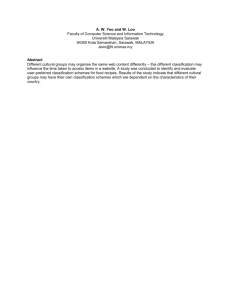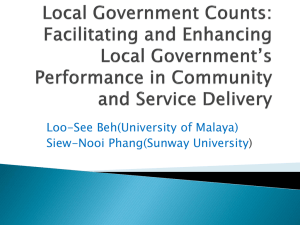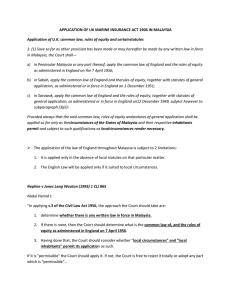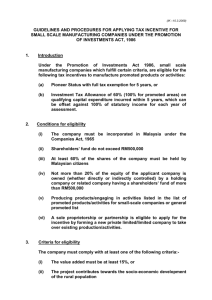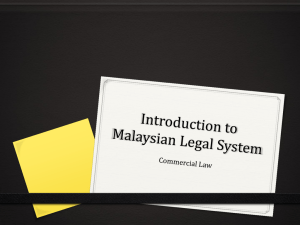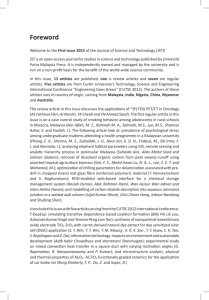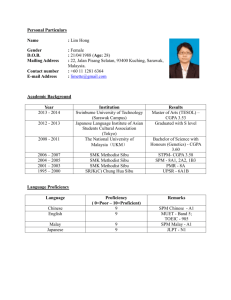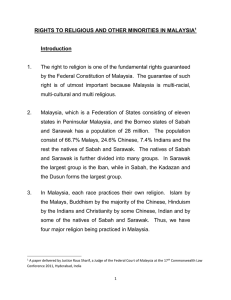Mys-legal-system - Real Estate Research
advertisement
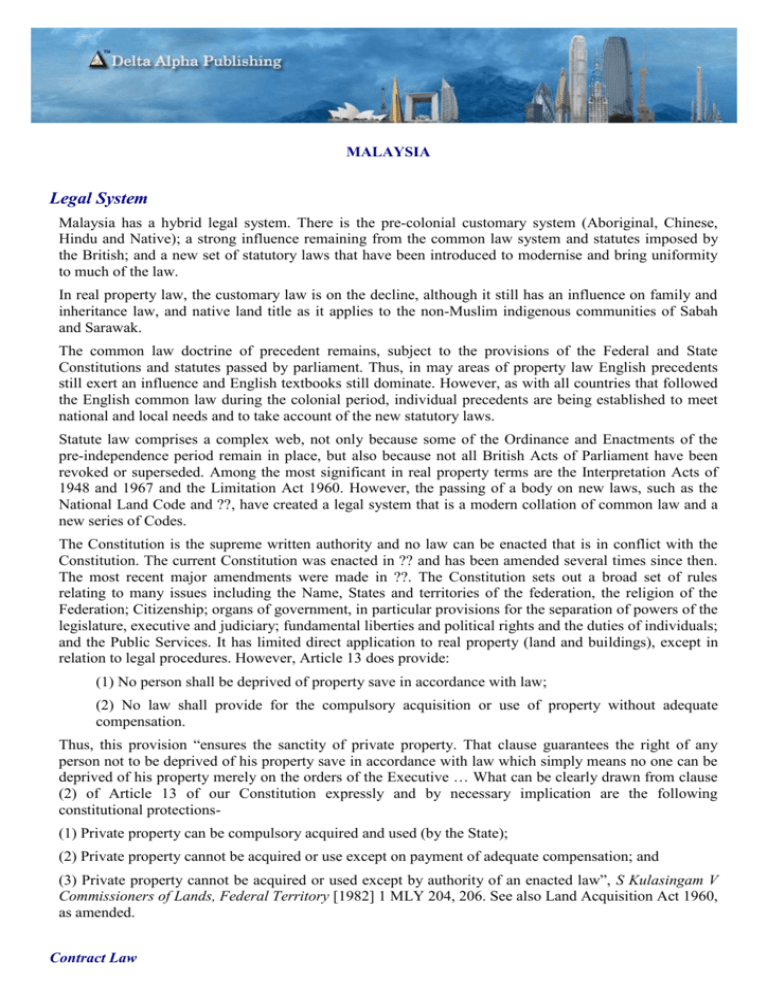
MALAYSIA Legal System Malaysia has a hybrid legal system. There is the pre-colonial customary system (Aboriginal, Chinese, Hindu and Native); a strong influence remaining from the common law system and statutes imposed by the British; and a new set of statutory laws that have been introduced to modernise and bring uniformity to much of the law. In real property law, the customary law is on the decline, although it still has an influence on family and inheritance law, and native land title as it applies to the non-Muslim indigenous communities of Sabah and Sarawak. The common law doctrine of precedent remains, subject to the provisions of the Federal and State Constitutions and statutes passed by parliament. Thus, in may areas of property law English precedents still exert an influence and English textbooks still dominate. However, as with all countries that followed the English common law during the colonial period, individual precedents are being established to meet national and local needs and to take account of the new statutory laws. Statute law comprises a complex web, not only because some of the Ordinance and Enactments of the pre-independence period remain in place, but also because not all British Acts of Parliament have been revoked or superseded. Among the most significant in real property terms are the Interpretation Acts of 1948 and 1967 and the Limitation Act 1960. However, the passing of a body on new laws, such as the National Land Code and ??, have created a legal system that is a modern collation of common law and a new series of Codes. The Constitution is the supreme written authority and no law can be enacted that is in conflict with the Constitution. The current Constitution was enacted in ?? and has been amended several times since then. The most recent major amendments were made in ??. The Constitution sets out a broad set of rules relating to many issues including the Name, States and territories of the federation, the religion of the Federation; Citizenship; organs of government, in particular provisions for the separation of powers of the legislature, executive and judiciary; fundamental liberties and political rights and the duties of individuals; and the Public Services. It has limited direct application to real property (land and buildings), except in relation to legal procedures. However, Article 13 does provide: (1) No person shall be deprived of property save in accordance with law; (2) No law shall provide for the compulsory acquisition or use of property without adequate compensation. Thus, this provision “ensures the sanctity of private property. That clause guarantees the right of any person not to be deprived of his property save in accordance with law which simply means no one can be deprived of his property merely on the orders of the Executive … What can be clearly drawn from clause (2) of Article 13 of our Constitution expressly and by necessary implication are the following constitutional protections(1) Private property can be compulsory acquired and used (by the State); (2) Private property cannot be acquired or use except on payment of adequate compensation; and (3) Private property cannot be acquired or used except by authority of an enacted law”, S Kulasingam V Commissioners of Lands, Federal Territory [1982] 1 MLY 204, 206. See also Land Acquisition Act 1960, as amended. Contract Law Contract law is fundamentally based on the common law, requiring an offer, acceptance and consideration. However, the law is now enshrined in the Contracts Act 1950 and the Specific Relief Act 1950. The Contracts Act contains many illustrations that were drawn from English case law. There must be a ‘meeting of the minds’ of the parties to the contract. In particular, there must be an offer (s. 2(a)); acceptance (s. 2(b); and these may be made expressly or by implication (s.9). There are provisions relating, inter alia, to communication (s. 3); qualification (s. 7); revocation (s. 6); enforceability (ss. 13– 30); performance (ss. 38–57); as well as provisions as to breach of contact (s. 40, ss. 74–75). The Specific Relief Act covers such aspects as recovery of possession; specific performance; rectification; rescission; declaratory decrees; and injunctions. Property Law Ownership Strictly all land in Malaysia is vested in the Ruler or Governor of the State (National Land Code, s. 40), which includes the bed of any river and the foreshore and bed of the sea. Laws may only be made by the State Legislature (although the Federal Government may make laws to ensure uniformity or to deal with matters affecting two or more States). Many of the terms used in Malaysian real property law are defined based on English law (land, real property, lease, easement), but the term real estate is used more colloquially and land (and material below and everything that is a part thereof) is used in a legal context (viz: National Land Code, s. 5, as amended). In particular, land is classified to include (a) State land; (b) reserved land; (c) mining land; (d) alienated land; (e) land held by strata title; and (f) certain customary land in Malacca. The State may alienate land in perpetuity (creating an interest that is considered equivalent to a freehold in English law) or for a tem of 99 years or less. The State may impose such conditions or restrictions as it considers appropriate. Land is normally only granted in perpetuity to the Federal Government, a public authority, when a grant is for a public purpose and there are special circumstances that make such a transfer appropriate. Most rights to land are held under a long-term ground lease from the State. Property may also be held as a Strata Title (equivalent to condominium in the USA). Any improvements to the land are owned by the holder of the land. Except in Penang, Malacca, Sabah and Sarawak, there are laws regarding the reservation of land for Malays. Significant changes to the land law in Malaysia have been brought about by the passage of legislation aimed at providing uniformity in many areas. Notably: National Land Code 1965; National Land Code (Amendment) Acts of 1984 and 1985. National Land Code (Penang and Malacca Titles) Act 1963; Sarawak Land Code; Sabah Land Ordinance. Land Acquisition Act 1960; Land Acquisition (Amendment) Act 1984 Strata Title Act 1985. The National Land Code is a complete and comprehensive code of law for land tenure, and the incidents of land tenure, in Malaysia. English common law rules do not override the code, unless there is an express provision to the contrary (United Malaysian Banking Corporation Bhd v Perungat Hasil Tanah, Kota Tinggi [1984] 2 MLJ 87, 85-97 (PC)). Foreign Ownership Foreign companies and non-citizens are permitted to own building land, subject to the prior written approval of the respective state authority. There are no restrictions on the acquisition of land for industrial purposes. There is an absolute restriction on the disposal or transfer of land to non-residents or foreign controlled companies. Generally there are no restrictions on transfer of funds in or out of Malaysia. Land Registration Malaysia has a form of land registration since the nineteenth century and introduced the Torrens title system in the 1920s. Since 1963/1965 the system has become the basis of land registration in most parts of the Federation (National Land Code Act (Penang and Malacca Titles) Act 1963; National Land Code Act 1965; Sarawak Land Code (Cap 81)). A non-Torrens system of land registration exists in Sabah (Land Ordinance (Cap 88)). As a rule, no document for the dealing in land, or any interest in land, is valid until the instrument has been duly registered. A registered title is ‘indefeasible’, i.e. guaranteed by the state for a bona fide purchaser, unless there is fraud, forgery or misrepresentation. See further Registering Property (Malaysia). Easement/Servitude A right that is similar to that created under English common law. However, an easement can only be created by express grant. Easement cannot arise by lost modern grant, prescription, or implied grant (National Land Code, s. 284). An easement may arise by ‘estoppel’, when that is based on the conduct and relationship of the parties; or as of ‘necessity’, if that is essential to the use of the land and should have been granted when land was transferred. Charge/Lien A secured transaction takes the form of a charge or statutory line. Land may be charged in whole or in part as security for a debt. Such a transaction is governed by the National Land Code. A charge must normally be registered, although if not registered it may create an equitable interest. A statutory lien is created by the deposit of documents of title or a duplicate lease as security of a loan (and not for any other purpose). A lien is not a registrable interest, but may be protected by the entry of a caveat on the land register. It takes effect when the caveat is recorded (if not registered it may create an equitable interest). Leases See “An overview of commercial Lease on Malaysia”. Terms in bold are defined and explained in the Encyclopedia of Real Estate Terms (Third Edition hardcopy and ONLINE <Uhttp://realestatedefined.comU>. Further information and references may be found in our Bibliography for **. This information is intended as an introductory guide and is intended to point out issues that may be of interest to a foreign investor. It does not constitute legal advice and should not be relied on as such. Professional advice is recommended on any issue referred to herein. Also, please see UDisclaimer.
